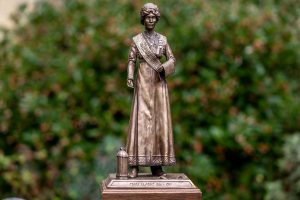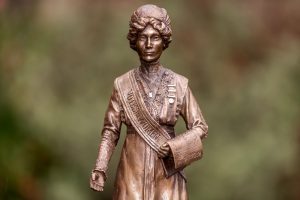The Mary Clarke Statue Appeal is calling for a ‘final push’ for funding for a  statuefor Mary Clarke, the Brighton-based suffragette who led the suffrage movement in the south east from 1909 -1910. She was imprisoned three times, then on Christmas Day 1910 was the first to die for women’s right to vote. There is no memorial to her anywhere in the country.
statuefor Mary Clarke, the Brighton-based suffragette who led the suffrage movement in the south east from 1909 -1910. She was imprisoned three times, then on Christmas Day 1910 was the first to die for women’s right to vote. There is no memorial to her anywhere in the country.
The charity which has the all-party backing of Brighton & Hove City Council and widespread support in the community, is determined to get the statue in place well before 2028, the centenary of the Equal Franchise Act 1928 which secured all women the vote. Unfortunately, charitable trusts rarely fund statues, but the Appeal lives in hope of business or other corporate sponsorship in addition to the many individual donations it receives.
It’s hoped that if the statue is in place before 2028, Brighton & Hove could attract government funding and be designated a U.K. ‘suffragette city’.
 The Appeal has raised £25,000 towards the £60,000 needed for sculptor Denise Dutton, to complete the statue, which it intends will be erected in New Road opposite the Theatre Royal, near the Pavilion Gardens.
The Appeal has raised £25,000 towards the £60,000 needed for sculptor Denise Dutton, to complete the statue, which it intends will be erected in New Road opposite the Theatre Royal, near the Pavilion Gardens.
The charity has already commissioned Ms Dutton to make a bronze model of the planned statue. It is currently displayed in the foyer of Brighton’s Jubilee Library. Amongst other works, Ms Dutton created the statue of Mary Anning in Lyme Regis; Annie Kenney in Oldham; and the Land Girl and Lumber Jill at the National Arboretum.
Mary Clarke was the sister of Emmeline Pankhurst and in 1906 helped her found the national Women’s Social and Political Union (WSPU). Thereafter she became the WSPU’s paid Organiser in Brighton, living in Victoria Road and working from WSPU offices by The Clocktower. She was injured in the notorious violence of Black Friday on 18 November 1910, during which 300 women were assaulted by police outside Parliament.
Mary was bedridden in Brighton for three days, then insisted on travelling back to London to protest about the police’s actions. Imprisoned for one month, she went on hunger strike and reportedly endured forcible feeding. She died of a brain haemorrhage on Christmas Day 1910, two days after her release from prison. She had sent a message from Court to her supporters in Brighton “I am glad to pay the price for freedom.”
Mary sacrificed her life, but was also a survivor. At a time when domestic violence was condoned and divorce almost impossible for women, Mary had escaped an abusive marriage. In the years that followed she dedicated herself to the struggle for women’s suffrage.
She was deeply committed to non-violence and was much admired for her ability to respond to hostile crowds, aggressive opponents and even violent attack with grace, courtesy and great courage. She was an inspiration to others, from the unknown young women she encouraged to take her place campaigning on Brighton seafront to famous suffragettes like Lady Constance Lytton and Emmeline Pethick Lawrence, who delivered Mary’s eulogy at her memorial meeting at The Royal Pavilion. Isabella McKeown, a brighton suffragette also spoke at the meeting saying those present should not “mourn in silence, but take up the torch and light the darkness..”. This inspired the design of the statue which depicts Mary laying down a lamp for others to pick up.
Mary was growing in confidence, speaking in public several times a week, travelling across the south east. She had everything to live for. She was very ill after Black Friday and friends tried to stop her travelling back to London. She must have known she was risking her life, but chose to face arrest and prison anyway. Her courage inspires people, especially survivors and young people.
The Appeal has recruited several youth ambassadors and volunteers who have been inspired by Mary’s life. The first was River Isaac who was seven and at Balfour Primary School when she first became involved. River campaigned for lessons about Mary and for better sports equipment.
She said: “I had been wanting to write to our headteacher to campaign for better football facilities for girls but had been too scared”….”But then I thought how Mary Clarke had done all these things, even though she must have been scared, and decided it was no reason for not doing something.”
Later, with the support of teachers, she and a group of friends set up the ‘Mary’s Lamp’ girls’ group: speaking to school assemblies about Mary; fundraising; asking councillors questions about women’s rights; and highlighting discrimination against girls in Afghanistan..
The charity intends to dedicate the statue to the memory of Mary Clarke and all women and girls who have died as a result of domestic, sexual or state violence.
As Chair of Trustees, I hope that local people, businesses and organisations will step up to make this happen. We know, because people tell us, that Mary’s life and sacrifice inspires others – especially her courage in the face of abuse.
We hope this statue will provide a way for people to commemorate not just Mary herself, but other local women and girls who have died by violence. They should be remembered and honoured. We are sure Mary would have wanted that.
For more information or to donate contact maryclarkestatue.com.
END
